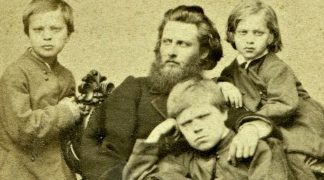
When we talk about Father Beyzym, we imagine the character of a great missionary and a true servant to lepers, whose memory lives among the descendants of those, who Father Beyzym saved from the death either due to the illness, or because of hunger. We forget that this outstanding man was once a boy, who came from a noble family and who had everything he could wish for. Who knows, maybe if his father had not taken part in the January Uprising of 1863, his life would have turned out differently. When Jan Beyzym was 13 years old, he suffered the loss of his father, who had to flee from the repressions after the Uprising was crushed out. He suffered the loss of his home, the conditions and standards of living he was used to. He studied far away from home, in Kyiv public school, lived in humble circumstances, had to earn his piece of bread. His character and personality was shaped by these circumstances. Father Beyzym had the gift of understanding for people in need. Later it helped him, when he was a missionary and worked in a far away country with people suffering from leprosy.
In the monograph of Father Ludwik Grzebień SJ titled “Blessed Jan Beyzym” we can find many interesting fragments of the letters, written by Father Jan’s childhood friends, their reminiscences of his green years. Those memories give us a unique possibility to see the personality of Father Beyzym in completely different light.
“About Father Jan’s student years we know from the letter, written in 1905 by Mrs. Octavia Górska Padlewska (his cousin) from the village of Kotiuzhany (a village in Vinnytsia Oblast, Ukraine). She wrote: “His vacations Janek usually spent with his family in the village of Śliedzie (now Slidy, a village in Vinnytsia oblast, Ukraine) in Podillya (Podillya – a historic region, located in the west-central and south-western parts of present-day Ukraine) in the family of my father Władysław Górski (Janek’s mother was my mother’s sister). Jan, being the oldest, was always serious and took care of the younger siblings. He shied girls. His clothes also did not suit the parlour life-style. On his arrival he took off his school uniform and used to wear high boots and a heavy jacket, known in our area as “hunia” or a linen jacket. It was next to impossible to make him change into the fashionable, formal or evening attire”. He liked to work in the field, took care of the village children, but shied the court life and the hubbub of the social life. “During the vacations and then the whole year of 1871 – 1872, before leaving for Galicia, he helped my father in his agricultural activities. He loved and needed physical work. He looked the happiest man having spent the whole day on the horse, or feeling tired from mowing or working with a flail or an axe. “I worked my socks off”, - he used to say. He was so human and understanding in relation to the farmers and domestic servants that everybody felt pity when he left Śledzie.
Another Father’s childhood friend, Ms. Janina Górska, the cousin of Mrs. Octavia Górska Padlewska, wrote: “My memories about him are quite modest, as I knew him in my childhood. The last time I saw him, I was probably 11 or 12 years old and he was the 7th grade student. I always met him during vacations, Christmas and Easter, which he spent with his mother and brothers at my uncle Władysław Górski’s house after the sad events of 1863. My memories about Beyzyms’ could be dated by 1865, when I became orphaned by the death of my mother. All the brothers were very kind to me. All of them had extremely warm hearts, especially Jaś and Kazio. Jaś was always too serious for his age, taciturn and avoiding lively meetings. He was exceedingly kind. I do not remember the case when Jaś and Kazio either quarrelled or fought. We used to argue quite often in our children company, as there were many of us in our two houses in Śledzie. Jaś did everything, which was nasty, heavy and difficult when we prepared for the game and then played it. He even did not make use of it. With usual selfishness of the childhood we immediately forgot about him, if we did not have the need in his kindness, strength and adroitness. He usually distanced from us when we made too much noise. He was the oldest of us all and could have been bored with us, but he never refused to help us.
His cousins often came. They were older than him and definite triflers, allowing themselves to tell inappropriate jokes. Jaś never belonged to that group. I do not remember him doing anything stupid or bad.
My last reminiscence about him is connected with his actions during the awful fire, which destroyed all the farm buildings and my father’s freshly stored crop. He and my uncle Mikołaj Stadnicki worked operating the fire-hose through the night, like simple workers, incomparably more fervently, though”.
Reference: L. Grzebień SJ, „Błogosławiony Jan Beyzym. Człowiek i dzieło” (Blessed Father Jan Beyzym. The Man and His Deed”, WAM Publishing House, Kraków 2014, pp. 76-78.
